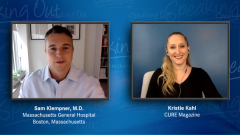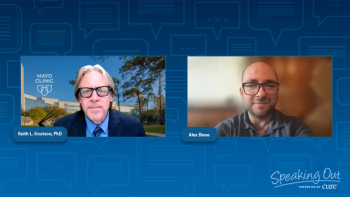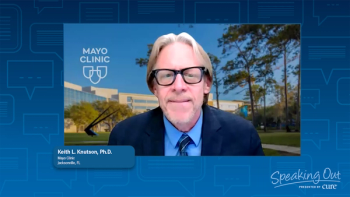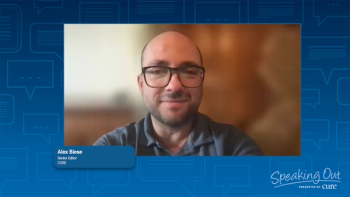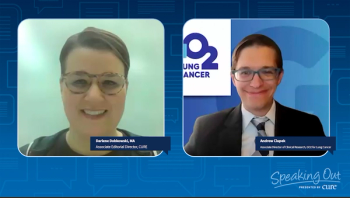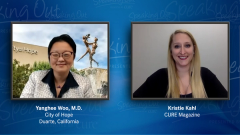
Increasing Research to Address Challenges in Gastric Cancer
Dr. Yanghee Woo highlights barriers that patients with gastric cancer face when looking to enroll in a clinical trial, and comments on the need for more participation in research trials that investigate ways to improve how the condition is screened for and treated.
Kristie Kahl: Hi, my name is Kristie Kahl, vice president of content at MJH Life Sciences™, the parent company of CURE® magazine. In this edition of the “Speaking Out” video series on behalf of Hope for Stomach Cancer, we’re speaking with Dr. Yanghee Woo from City of Hope about the need for more research and clinical trials in gastric cancer. Hi, and welcome.
Yanghee Woo, M.D.: Hi, Kristie. I’d like to thank your magazine and Hope for Stomach Cancer for hosting me on the CURE® “Speaking Out” video series on stomach cancer, aka gastric cancer. This topic is very dear to my heart because research in gastric cancer is so important.
Kristie Kahl: Thank you. To start, what are the challenges we see in gastric cancer research?
Yanghee Woo, M.D.: While gastric cancer is the third leading [type] of cancer worldwide after lung and liver, in the United States gastric cancer is considered an orphan disease. It’s not that common, and so there is not as much awareness about the need for research in gastric cancer. Awareness of this unmet need within the society at large, such as this program, is absolutely necessary to overcome some of the challenges, such as we need to increase interest. We need a critical mass of researchers and translational scientists to bring about these exciting, new scientific discoveries that are happening every day in other cancers. We want those cures to come to patients with gastric cancer, and this doesn’t happen as a default. We have to make a concerted effort to study these new drugs in patients with gastric cancer, to be able to offer them as cures for gastric cancer, specifically. One of the greatest challenges we face as scientists or other clinician-researchers is the lack of funding. There is a strong positive correlation between the amount of funding given to a specific cancer and the ability to discover better treatments and increase cancer-specific survival. In gastric cancer, there is not much funding allotted to it, whether it’s from the NIH [National Institutes of Health] or by the public at large, so we need to increase awareness, interest, and funding for this. There’s much more funding for resources for breast, colorectal and prostate cancer. Disproportionately, because gastric cancer incidence is so low in the United States, we don’t get to see much of that funding. Increased funding for gastric cancer research and programmatic development are required both at the institutional level and the national level to support teams translating these novel therapies that are coming out to be able to reach our patients.
Kristie Kahl: What are we doing to address those challenges?
Yanghee Woo, M.D.: First, I’m so grateful for programs like CURE® for sharing this information, and also for the Department of Defense’s funding mechanisms of uncommon cancers through their congressionally direct medical research programs, and for the AACR [American Association for Cancer Research] Stand Up to Cancer [program], which is funding research specifically for gastric cancer. I cannot highlight how important these dollars are to the research, because these enable clinician-researchers like myself and Dr. Klempner to bring better diagnostic tools and treatments specifically addressing those needs of our patients with gastric cancer. Secondly, these are made possible because patient advocacy groups, such as Hope For Stomach Cancer, Debbie’s Dream Foundation, No Stomach for Cancer, and Stomach Cancer Foundation, continue to advocate for more funding, advocate for our patients, and for research and support of patients and their loved ones. It’s a team effort to go forward to bring these cures for our patients with gastric cancer. These are national efforts. At City of Hope, we’re building and expanding our multidisciplinary gastric cancer team of not just clinical experts, but translational scientists. We are not just here in Southern California, but we’re teaming up with national teams like at Mass General [Massachusetts General Hospital] and MSKCC [Memorial Sloan Kettering Cancer Center], across the country, in Chicago and in Texas, and bringing together international experts with the same goal of finding a cure for gastric cancer. This brings us together to evaluate new immunotherapies that are now available for gastric cancer treatment, mostly in the stage 4 metastatic setting. Many of these drugs are tumor-specific targeting agents, and these need to continue to be evaluated for gastric cancer specifically. We’re working toward doing that, finding mechanisms, how these drugs interact, and how they will benefit specifically a certain group of patients with gastric cancer.
Kristie Kahl: With this, why is it important for patients to consider joining a clinical trial?
Yanghee Woo, M.D.: The results of clinical trials define the way a drug is going to be used for our patients, whether in gastric cancer or other cancers. The results of clinical trials that investigate these novel therapies will determine whether the drug will be useful for patients with gastric cancer and which patients they would benefit. The results can only reflect the patient population that it studies. Therefore, we need as many patients [as possible] who qualify for the trial to enroll because the results of the trial will reflect how they responded to the therapy and how important it is for the disease itself, the gastric cancer. For a clinical trial, usually your eligibility means that they’re testing this new therapy to see how effective it is in patients just like yourself, for now and for future use.
Kristie Kahl: What are the challenges or barriers that we see with patients joining a trial?
Yanghee Woo, M.D.: When I speak to patients about clinical trials, there are patient-specific barriers, and then there are trial-specific barriers. There are two distinct things. For the patients, I think there is some concern about understanding what the trial really means and trusting that the trial would be best for them. This, when we talk about it, can be clarified. Then there are some language and cultural barriers because a lot of this communication requires a lot of explanation, a lot of moving pieces, and requires a longer time to translate and speak in the language that they can understand. These are fairly patient-specific barriers and are perhaps one of the reasons we don’t see that many ethnic minorities enrolled in clinical trials. More than 85% of people on clinical trials are English-speaking patients. With clinical trial-specific barriers, because these studies are mostly for advanced-stage disease, although it’s changing, the inclusion criteria usually require that the disease be measurable. Unlike tumors in the breast and pancreas or the liver, sometimes the tumors in the stomach are not measurable by the criteria required by the study. So, you can be excluded because you don’t have measurable disease, and some of the patients may have experienced this. The other is that some of the diseases in the peritoneum, the stage 4 cancers, are not detectable by routine imaging. So, the criteria for enrollment are not completely inclusive of all of the diseases that need to be evaluated by clinical trials. Sometimes the randomization of the studies [is a barrier], meaning you can randomly be placed into a standard of care arm, receiving placebo and not the investigational drug, and this concerns some of our patients.
Kristie Kahl: Are there any misconceptions about trials that we can try to help negate?
Yanghee Woo, M.D.: I’m sure there are a few. I think some patients believe, like I was mentioning before, “Only if I get the test drug will the trial be beneficial in a randomization.” The truth is that the investigational strategies are investigational—that’s why we have the studies. We do not know if one strategy, one arm or the other, would be better, and that’s why it’s being tested. Unfortunately, until the completion of the study, we will not know which is the better of the two clinical trial arms being tested. That’s what’s being investigated. The other is that some patients believe they will get better treatment if they enroll in a study, or conversely, if they don’t enroll in a study as requested by the clinician that somehow, maybe the treatment wouldn’t be as good. This is not true. Whether you are on a standard of care treatment or a clinical trial, most academic places that run clinical trials obviously will treat you to the best of their abilities. The difference is that on a trial, there are a lot more people who interact with you because the trial needs to be carefully monitored, and there’s more staff. You may get more blood tests, you may get more questioning, so there’s a lot more interaction in a clinical trial versus the standard of care plan. If you enroll in a study, some believe that it may delay the start of your treatment, and this may be true since many of the newer trials require a biomarker, testing of your tumor to see if you make a specific protein, which takes some time, and may delay the start of your therapy.
Kristie Kahl: What do patients have to look forward to in gastric cancer research?
Yanghee Woo, M.D.: This is a really exciting time for gastric cancer research. I finally feel that we are gaining momentum in the U.S. and worldwide for critical mass to address gastric cancer at all levels of research. For example, in prevention and early detection, as I mentioned previously, we’re hoping for new guidelines to address ethnic disparities and screening of gastric cancer in the high-risk patients. This will require research to validate such protocols. There are blood-based early detection methods coming out, like are being tested for breast and colorectal cancer. We’re now starting to investigate such things as circulating tumor DNA, microRNA and genomic markers of tumors that are in our blood to be able to detect your gastric cancer early or detect recurrence of gastric cancer in the blood noninvasively. These are exciting times for early detection.
Then there are really exciting and probably very novel immunotherapies that are about to come to reality, being tested soon at City of Hope. These are investigational, and I’m hoping that in the near future, in the next couple of years, we will see some oncolytic viruses that kill cancer. We’re investigating these in the preclinical realm right now, viruses that can kill cancer and deliver antitumor proteins, B-cell vaccines that can attack specific markers on the gastric cancer T cells that target and kill gastric cancer. These are programs of preclinical development that are very close to going into clinical trials. I’m sure you’ll hear more about them.
Novel methods for effective delivery for gastric cancer treatment is another [exciting area]. For example, pressurized intraperitoneal aerosolized chemotherapy is a method of delivering chemotherapy to the peritoneum for patients with peritoneal disease. We have a phase 1 clinical trial ongoing at City of Hope. It is a national study, studying the delivery mechanism for patients with gastric cancer. Ultimately, I hope to be able to offer our patients a robust portfolio of precision oncology, and to bring all of these novel therapies in a concerted effort for the improvement of patients with gastric cancer. It doesn’t happen automatically. You have to put a lot of effort into it. Lastly, as a surgeon, I expect that we will have smarter and more intelligent robotic surgical systems we can use as a tool to improve surgical outcomes in gastric cancer. These are very exciting times.
Kristie Kahl: Absolutely. Thank you so much.
Yanghee Woo, M.D.: Thank you, Kristie.
Transcript edited for clarity.

